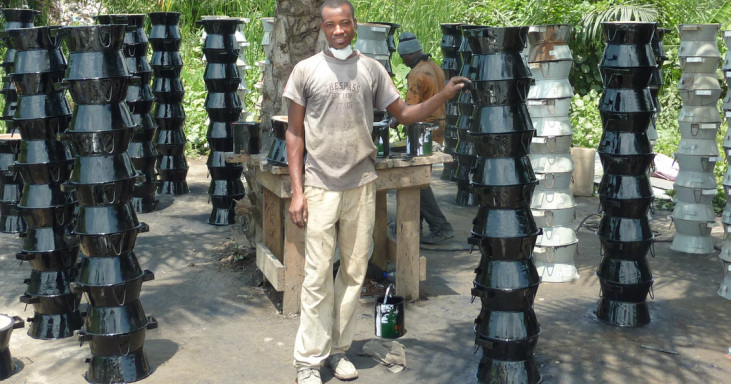 Peter showing his freshly painted Gyapa fuel-efficient cookstoves Peter Amako Atta began producing Gyapa cookstoves nine years ago and has grown into one of the largest stove manufacturers in Ghana. Based in the Achimota neighborhood of Accra, Peter used to sell shoes on the side of the road. Selling shoes offered no steady employment as Peter relied upon unpredictable consignment availability and product. Often, when shipments were delayed, Peter had no work. Peter was a part of the informal business sector in Ghana and without a set sales outlet.
In 2003, Peter received training from EnterpriseWorks to become a metal artisan manufacturing partner. Peter was attracted to the opportunity to become a manufacturer because of the importance he thought Gyapa cookstoves could be to Ghanaians. "Gyapa is very economical and saves a lot of charcoal for families," Peter said. He sensed that the Gyapa cookstove would be a very popular product in Ghana and wanted to be involved with the product as a sustainable and long lasting way to earn a living.
Peter began his business manufacturing the stoves himself, producing fewer than 100 stoves per month. Focused on growing his business each year, Peter has transitioned from a single manufacturer to managing his own business. Peter’s manufacturing site, peacefully hidden in the middle of a small banana plantation behind a city landfill, has grown to be one of the largest Gyapa producers in Accra. He now manages ten employees and produces over 1,200 stoves per month. Peter has grown his business each year and reinvested his profits to expand his operations. Stoves produced out of this site continue to be of the best quality and are sought after by retailers and consumers. Peter and his team manufactured nearly 10% of all Gyapa cookstoves in Ghana in 2012. “It is a very good product that people will buy and we can sell this nationwide. It saves charcoal and saves people money. I am planning to expand my business to access even more customers." Through his business success, Peter has also been able to purchase a plot of land where he plans to build his future home.
Peter has benefited from working capital loans from Gyapa Enterprises which he has used to expand his production capacity. We have provided almost $60,000 in loans and grants to cookstove production partners in our value chain just like Peter. Through the sale of carbon credits, we're able to provide strategic sustainable investments throughout the value chain, working to support individual business and to expand market linkages and networks to increase access of Gyapa stoves to new communities and households.
“With the support of ClimateCare, carbon finance has enabled RI/EW to take a market based approach to the GyapaTM program in Ghana and turn it into a self-sustaining model for success across the sector. ClimateCare’s unparalleled expertise in the carbon market has resulted in the continued sale of GyapaTM carbon credits which has provided the necessary investment for continued growth and success,” states Chip Levengood, RI Board Chairperson.
Meet Mr. Adolph, Regional Marketing Manager in the Ashanti and Brong-Ahafo regions of Ghana. Based in Kumasi, Adolph has worked with Gyapa Enterprises for a year. He not only leads marketing and sales efforts in the region, looking for ways to bring Gyapa cookstoves into new territories, but he also coordinates 3 ceramicists, 46 metal artisans and 90 retailers. In addition to monitoring this value chain, he also helps manage micro-impact investments Gyapa Enterprises makes into cookstove producing parterns' businesses.
When asked about his favorite part of the job, Adolph replied, "I meet a lot of people and we share a lot of experiences. That has given me a great insight into life."
In his interview (above), Adolph discusses his work with Gyapa Enterprises. He also highlights the loan assistance Gyapa Enterprises has provided a ceramicist in our value chain.
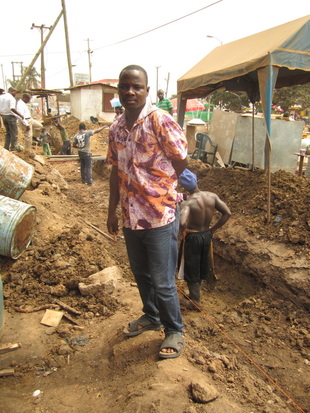 Gyapa cookstove manufacturer, Labaran Issaka Gyapa cookstove manufacturer, Labaran Issaka Most people in developed countries take something for granted: rights to the land that they live and work on. But Gyapa cookstove manufacturer, Labaran Issaka, says land rights are a hard thing to come by in the informal sector in Ghana.
Labaran took on the family's metal manufacturing operation in Ashaiman many years ago. His father started the operation in the 1970's on what Labaran describes as "no man's land" outside of Accra and Tema (now one of Ghana's largest port towns).
"The land belonged to the chief, but no one was here. There wasn't even a road," explains Labaran. "People would just find land that was empty and start businesses. It wasn't an issue when my father opened up his business 35 years ago." The Issaka manufacturing business has been running on this land ever since.
But now it is an issue.
Several years ago, the government built a road cutting across part of Labaran's operations. And two years ago, a private citizen began putting up a shopping center on the other side of Labaran's production area. "Labaran's land" was quickly shrinking. But with no rights to the property, there wasn't much he could do.
"Even though my family has been working on this land for more than 30 years, we have no documents to show how long we've been here."
Labaran explained that years ago, chiefs tended to grant people some limited land rights . A sale of the land would take place between the chief and a private citizen or company, and if squatters had been there for years, they were often granted a small portion of that land.
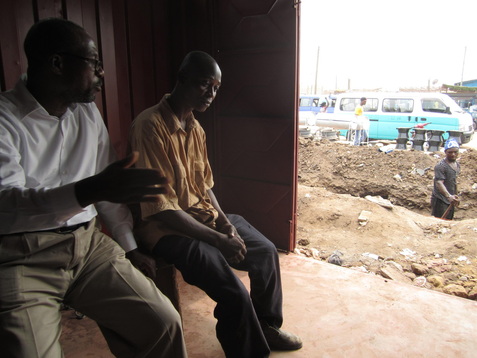 Gyapa Marketing Manager (left) discusses moving with Labaran's brother Gyapa Marketing Manager (left) discusses moving with Labaran's brother Not knowing exactly when the land was sold, though, Labaran explains that there's little appeal that can make to the current chief. "Three chiefs have passed since my father started the business here. I can't prove to the current chief that my family has been here, so what can he do? Chiefs a few generations back would have been the ones to grant us part of this land, and that didn't happen. So now we have to go."
The Ghanaian government has recently decided to expand the road that runs next to Labaran's operations. Without much warning, construction workers showed up to begin digging ditches for new pipes and electric wires. "They started on the other side of the road, so at least we knew that they were coming to our side soon," exclaims Labaran.
Labaran's manufacturing group now has construction occurring on both sides of their operating area between the road expansion and the shopping center (which is currently concrete floors and a few walls).
When asked what the timeline was for being evicted from his Ashaiman location, Labaran said "I don't know. They don't give us any warning. They could destroy our manufacturing center at any time. They can decide what they want to do and they don't have to give us a timeline."
With the great relationship that Gyapa Enterprises has formed with Labaran and his cookstove manufacturing group, we've taken on the task of finding land close by so Labaran and his colleagues can move operations quickly. We'll take on the up front rent costs associated with a new location. Gyapa Enterprises will then investigate the possibilities of a centralized production center for Labaran's group and our other manufacturing partners in Accra who are interested in a stable location to work from.
In the meantime, Labaran and his employees continue going to work, not knowing when their facilities will be torn down. It's a difficult way to operate. Without rights to land, Labaran's longtime family business in Ashaiman will soon be a memory.
PRESS RELEASE
Second Consecutive Carbon Credit Issuance Sets Record for Largest for Cookstoves by The Gold Standard Registry – Issued to Relief International/EnterpriseWorks (RI/EW)
Accra, Ghana (May 23, 2013) – For the second consecutive issuance the largest single number of carbon credits for any cookstove project certified by The Gold Standard – the benchmark standard for quality and rigor in the compliance and voluntary carbon markets – has been issued to Relief International’s EnterpriseWorks (RI/EW) division. Over 400,000
| Verified Emission Reductions (VERs) were generated and sold through The Gold Standard Registry; with each VER equivalent to one metric ton of carbon emissions. This transaction firmly places RI/EW as the leader in applying innovative finance to the power of entrepreneurship as a business model to combat poverty. Since 2007, nearly half a million Gyapa™ stoves have been sold, impacting over 2.4 million Ghanaians and saving users over $40.6 million in fuel costs which equates to over 800,000 acres of forests. The success of the project comes as a result of years of innovative work by RI/EW in the clean stoves sector in close partnership with ClimateCare, the U.S. Government’s USAID and EPA, and the Shell Foundation.
This record-breaking issuance of carbon credits is in acknowledgment of emission reductions through the use of Gyapa™ cookstoves in Ghana. Since 2002, EnterpriseWorks (EW) has played a critical role in Ghana realizing sustained growth in sales of fuel efficient cookstoves, capturing carbon credit while reducing disease and poverty. The production, sale and use of these low-cost innovative stoves which were developed by RI’s EnterpriseWorks, drive economic growth along with environmental impact.
| Gyapa Cookstove Carbon Credit Impact | Importantly, they also have a direct health impact by reducing household air pollution. The stoves last longer, reduce fuel costs, and are safer than traditional cookstoves. Registered as a carbon finance program in late 2007, the Gyapa™ fuel efficient cookstove has played a critical role in Ghana, realizing sustained growth in sales through the continued development and success of its local production, distribution and sales network throughout Ghana. RI/EW’s Gyapa™ industry has grown to include over 400 independent producers and 500 retail agents throughout Ghana. RI/EW takes a unique and innovative approach to promoting the Gyapa™ cookstove by partnering with and investing in entrepreneurs to support the continued growth of local industry. The production, sale and use of these low-cost innovative stoves drive economic growth along with environmental impact. The Gyapa™ stove technology reduces charcoal usage by up to 50%, reduces harmful smoke inhalation for the cooks and household, and is more durable and safer than traditional stoves. Gyapa™ stoves are sold in four different sizes to accommodate domestic and commercial cooking needs, providing significant socioeconomic, environmental, and health benefits to stove users and their communities. “Relief International has again demonstrated its leadership in the sector with progressive actions to combat poverty,” says Chip Levengood, Chairman of RI/EW’s Board, “Demonstrating the transformative impact of pairing innovative business strategies with development, this project has solidified itself as the leading improved cookstove program through its second consecutive record breaking issuance.” “Gold Standard cookstoves account for around 75% of carbon market cookstove projects worldwide,” says Adrian Rimmer, CEO of The Gold Standard Foundation, “We congratulate RI/EW’s Gyapa™ project for being part of this and delivering emission reductions and sustainable development impact at such scale.” “Since it was founded, ClimateCare has advocated integrated Climate and Development projects, designed from the outset to protect the environment and improve people’s lives” explains ClimateCare Director, Tom Morton “The Gyapa™ Stoves project is an excellent example of this approach. Having helped structure finance for this project, we’re delighted to see it cutting a record amount of carbon and having such a positive impact on the lives of local people.” ### Media Contact Carole Lundgren, Social Enterprise Development Officer carole.lundgren@ri.org About EnterpriseWorks and Relief International EnterpriseWorks (EW), a division of Relief International (RI/EW), utilizes sustainable, enterprise-oriented solutions to combat poverty’s systemic impacts. For 35 years, EW has built local private-sector driven efficiencies in energy, water, agriculture, and natural products/natural resource management value chains. Relief International is a Los Angeles-based global humanitarian organization that transforms adversity into renewal for the world’s most vulnerable populations. RI/EW’s team of 2,000 relief and development professionals work to bridge the gap between immediate emergency relief and long-term community development through innovative and holistic programming that is grassroots-based. In 2009, EW merged with Relief International bringing together two leaders in their respective fields. For more information, please visit www.ri.org and www.enterpriseworks.org and www.gyapa.com. About The Gold Standard For ten years, The Gold Standard has pioneered the way climate change is addressed. Its ‘results based finance’ approach - in which individuals, corporations and governments buy credits against verified emission reductions and sustainable development outcomes - has channelled more than half a billion Euros into 900+ low carbon development projects that would otherwise not have gone ahead. The Gold Standard was established in 2003 by WWF and has more than 80 NGO partners worldwide. For more information, please visit: www.cdmgoldstandard.org About ClimateCare ClimateCare mobilises the power and scale of private finance to deliver projects with positive environmental and social impacts around the world. We combine the vision of a social enterprise and the commercial experience of an investment bank. Leveraging mainstream funding, we profitably deliver some of the largest, most successful corporate sustainability initiatives in the world. From offices in Africa, Europe and Asia Pacific we help many of the world’s leading brands, organisations and governments scale up the impact of their initiatives. By investing their resources in projects that directly combat climate change and poverty, improve health and increase community welfare, we build better futures for millions of people around the world. For more information, please visit www.climatecare.org.
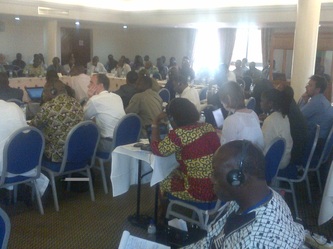 Amavi Bada, Regional Enterprise Development Manager, recently attended the West Africa Clean Cooking Alliance (WACCA) conference in Ouagadougou, Burkina Faso. WACCA is an initiative of The ECOWAS Centre for Renewable Energy and Energy Efficiency (ECREEE). This West African regional organization's main objective is to provide access to efficient, sustainable and affordable cooking energy in the ECOWAS (Economic Community of West African States) region. During the 3-day conference, he's been able to share best practices and challenges on clean cooking and how these challenges are overcome from within the region and beyond. In addition, he's engaged and debated on how to achieve an integration of clean cooking into national energy strategies. As a group, participants are taking the dialogue forward on developing policies and planning tools that promote clean, safe, and efficient cooking as a driver of economic growth and improves environmental and social conditions. The group will end the conference by creating and validating the WACCA Regional Action Plan to set the agenda as a region for the upcoming years.
| There was also a 3-day exhibition that showcased regional and international exceptional products, technologies and services in the area of efficient and clean cooking from West Africa and other regions.
Amavi has had the opportunity to engage and connect with other organizations with a passion for clean cookstoves, and look forward to creating partnerships within the region.
| |
Akwaaba, welcome to our website and our blog! We're excited you're here and are interested in learning more about what we do in Ghana and West Africa. We operate one of the largest locally-produed carbon-financed cookstove programs in the world. We've built an intricate and effective value chain that can produce and distribute products throughout West Africa. Because of this success, we've been able to add additional high-impact low-cost products to our distribution channels, such as water filters and rain water harvesting and storage devices. We've positively impacted millions of people's lives with our products, and we look forward to showing you this impact through our blog, our website, our photos, videos, and social media channels. We're particularly excited to introduce you to the entrepreneurs in our value chain. We work with over 1,000 entrepreneurs in West Africa, from metal and ceramic artisans, to distributors and retailers. Each one of these entrepreneurs has a story of how Gyapa Enterprises has impacted their life. We'll bring you their stories, as well as notes from the field. Take a tour of our website and let us know what you think. Follow us on our social media channels and sign up for our RSS feed as we keep you updated on our work and impact. Meda 'ase ('Thank You!' in Twi, a Ghanaian language).
|

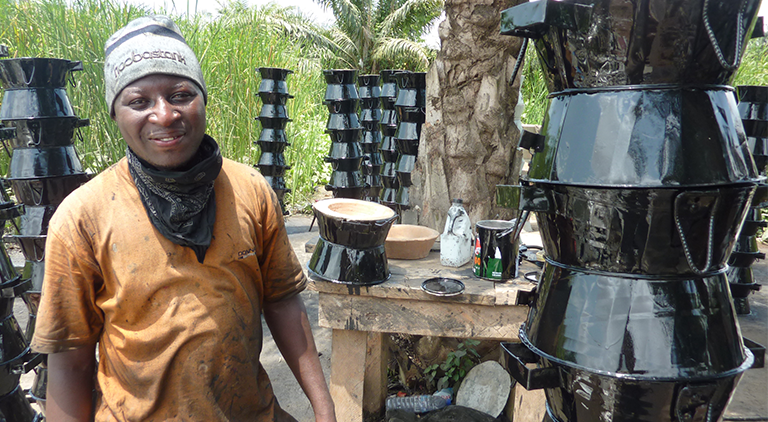



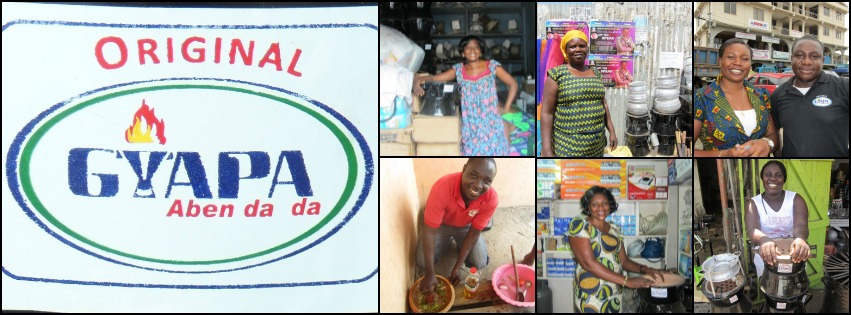
 RSS Feed
RSS Feed
